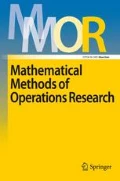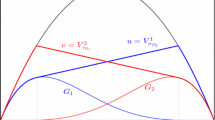Abstract
Various models of 2-player stopping games have been considered which assume that players simultaneously observe a sequence of objects. Nash equilibria for such games can be found by first solving the optimal stopping problems arising when one player remains and then defining by recursion the normal form of the game played at each stage when both players are still searching (a 2 × 2 matrix game). The model considered here assumes that Player 1 always observes an object before Player 2. If Player 1 accepts the object, then Player 2 does not see that object. If Player 1 rejects an object, then Player 2 observes it and may choose to accept or reject it. It is shown that such a game can be solved using recursion by solving appropriately defined subgames, which are played at each moment when both players are still searching. In these subgames Player 1 chooses a threshold, such that an object is accepted iff its value is above this threshold. The strategy of Player 2 in this subgame is a stopping rule to be used when Player 1 accepts this object, together with a threshold to be used when Player 1 rejects the object. Whenever the payoff of Player 1 does not depend on the value of the object taken by Player 2, such a game can be treated as two optimisation problems. Two examples are given to illustrate these approaches.
Similar content being viewed by others
References
Bensoussan A, Friedman A (1974) Nonlinear variational inequalities and differential games with stopping times. J Funct Anal 16:305–352
Bensoussan A, Friedman A (1977) Nonzero-sum stochastic differential games with stopping times and free boundary problems. Trans Amer Math Soc 231:275–327
Dynkin E (1969) Game variant of a problem on optimal stopping. Soviet Math Dokl 10:270–274
Ferenstein E (1993) A variation of the Dynkin’s stopping game. Math Japonica 38(2):371–379
Fushimi M (1981) The secretary problem in a competitive situation. J Oper Res Soc Jpn 24:350–358
Gilbert J, Mosteller F (1966) Recognizing the maximum of a sequence. J Am Stat Assoc 61:35–73
Ohtsubo Y (1987) A nonzero-sum extension of Dynkin’s stopping problem. Math Oper Res 12:277–296
Porosiński Z, Szajowski K (2000) Full-information best choice problem with random starting point. Math Japonica 52:57–63
Porosiński Z and Szajowski K (2000) Modified strategies in two person full-information best choice problem with imperfect observation. Math Japonica 52:103–112
Ramsey D, Szajowski K (2006) Correlated equilibrium in Markov stopping games. Eur J Oper Res (in press) doi:10.1016/j.eror.2006.10.050
Sakaguchi M (2001) Optimal stopping games where players have weighted privilege. Game Theory Appl 4:116–131
Sonin I (1999) The elimination algorithm for the problem of optimal stopping. Math Methods Oper Res 49:111–123
Stettner L (1982) Zero-sum Markov games with stopping and impulsive strategies. Appl Math Optim 9:1–24
Szajowski K (1994) Markov stopping game with random priority. Math Methods Oper Res 39:69–84
Yasuda M (1985) On a randomized strategy in Neveu’s stopping problem. Stochastic Proc Appl 21:159–166
Author information
Authors and Affiliations
Corresponding author
Rights and permissions
About this article
Cite this article
Ramsey, D.M. A model of a 2-player stopping game with priority and asynchronous observation. Math Meth Oper Res 66, 149–164 (2007). https://doi.org/10.1007/s00186-006-0136-7
Received:
Accepted:
Published:
Issue Date:
DOI: https://doi.org/10.1007/s00186-006-0136-7



